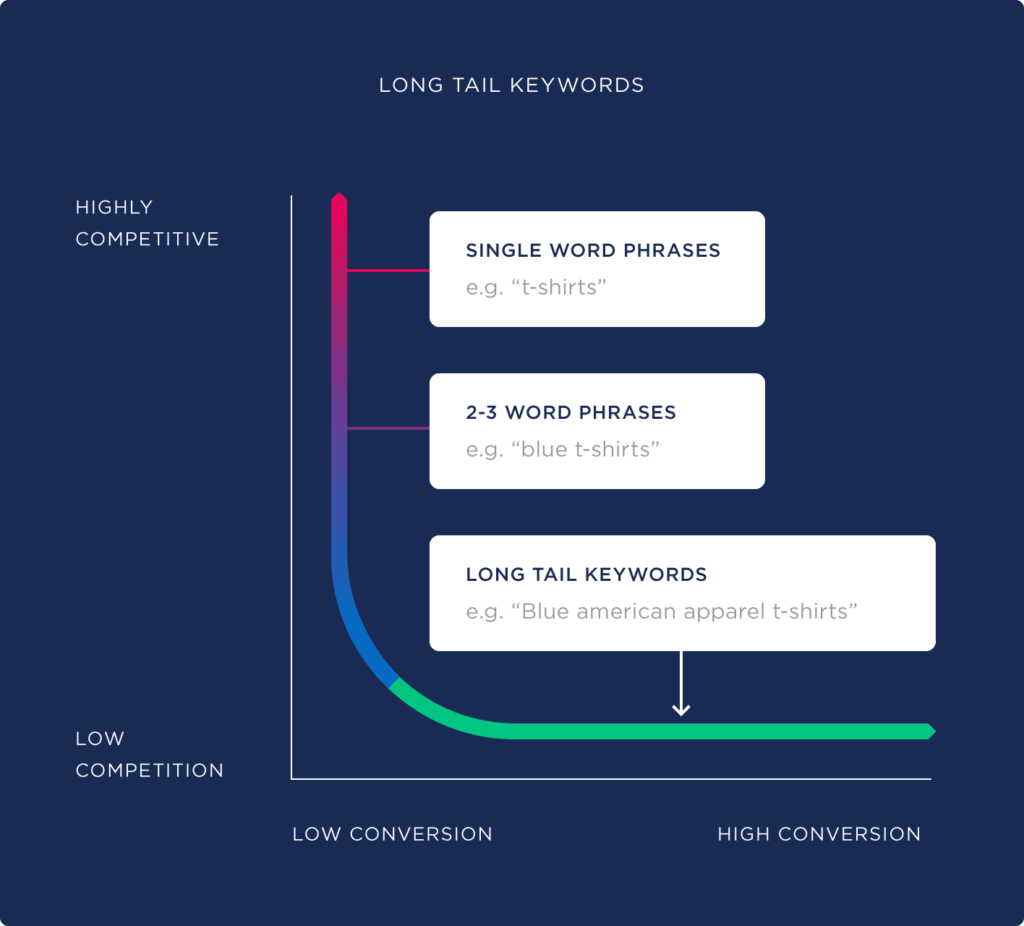Keywords have been the lifeblood of online search for as long as SEO has existed. However, beyond organic search engine optimisation, a solid keyword strategy is also the cornerstone to an evergreen, long-lasting PPC (pay per click) campaign, too.
While keywords do still have a firm place in modern SEO, their importance in PPC are often overlooked. After all, buyer research is becoming more and more dependent on Google in particular.
Therefore, it makes sense to ensure your Google Ads keywords are relevant and are focused on buyer intent. But, let’s get back to basics. What are keywords when it comes to Google Ads, and how can a digital marketing agency help you to harness them?
Keywords in brief
Keywords are terms and phrases that everyday searchers type into Google. In this context, i.e. your online marketing campaign, they are terms that will help your Google Ads appear to relevant searchers.
Here at fent Marketing, we use a variety of different tools and methods to balance out keyword campaigns. For example, if you’re learning how to find keywords for SEO as well as PPC, you’d use different keyword match types to narrow down the audience, resulting in a more targeted approach.
It’s worth remembering that keyword research isn’t always a precise process, and that these phrases will regularly change depending on your target market and browsing behaviours. That’s why it pays to work with a Google Partner like Fenti Marketing who can pivot your ad campaigns across long periods of time.
Crucially, the point to in-depth keyword research and analysis is to make sure that your campaigns are targeting buyer intent and delivering. Go too generic, and you risk approaching people who will never complete the sales funnel.
Now we know a little bit about the basics, let’s dig into keyword types.

Different types of keywords
Here’s where things can get a little complex. Depending on the type of search taking place, and where the searcher may be in their buying journey, different types of keywords have varying relevance. Here’s what to look for.
Generic keywords
Generic keywords are sometimes known as ‘short-tail’. They have no intention. For example, ‘garden shed’ tells us someone is looking for a topic, but not necessarily if they wish to buy a shed (in this instance).
Location keywords
This is where intent starts to creep in. Location keywords are phrases that apply local areas to generic phrases. For example, ‘Sheffield florists’ is a little more precise than ‘florists’ alone. This phrase suggests the searcher is looking for flowers to buy in and around Sheffield.
Transactional keywords
Transactional keywords can add more intent to a generic phrase. For example, a transactional version of ‘garden sheds’ might be ‘garden shed builders’. It tells us that someone may be looking for help building a shed – we’re getting closer to the intent.
Informational keywords
These keywords and phrases don’t often apply to Google Ads, however are worth remembering. These tend to arise in the form of questions. ‘How do I build a garden shed?’, for example, is an informational keyword phrase.
Long-tail keywords
Long-tail keywords are extremely valuable and can be highly specific. ‘Cheap garden shed suppliers’, for example, offers clear intent. You’ll normally find at least three words in a long-tail phrase.
Keyword matching
In addition to keyword types, there are also different types of keyword matching. These are:
Exact matching
As the name suggests, these keywords precisely match what the searcher is looking for. This can lead to low volume of searches, but it can also be easier to manage, at least initially.
Broad matching
Broad matches are the opposite of the above. These are not laser-focused, and will instead take your keyword and potentially apply it to a wider set of intents and niches. If you intend to narrow down your audience, this is not a great option – but it can give you a lot of scope.
Broad match modifier
This type of matching works great alongside exact matching as it can help you to harness how broad your search scope travels. You simply add in identifiers to rein in your broad match.
Phrase matching
Phrase matching is a more precise approach – you’re targeting very specific phrases. This can be excellent if you have a particular niche, but otherwise, it can mean low search volumes.
When setting up Google Ads keywords, we highly recommend a blend of exact matching and broad match modification.

What are negative keywords?
Negative keywords, as you might expect, is the opposite of the main keyword standard. You’re choosing phrases that you don’t want to target, therefore niching down your scope.
For example, if you want to target ‘Sheffield shed suppliers’, but don’t want to end up displaying ads to people searching for greenhouses, you can set ‘greenhouse’ as a negative keyword. This can help you optimise your budget and deliver a more productive campaign.
What happens next?
While it’s entirely possible to learn how to set and manage keywords for Google Ads on your own, it is a process that can take years to perfect. What’s more, if you are already busy running a business, it’s likely you may not have the time to give it your attention.
Therefore, be sure to set up a digital marketing campaign with a Google Partner in your area. At Fenti, we help local and regional businesses and entrepreneurs pinpoint who they want to sell to – even when Google changes the goalposts. We help you get fast results with precision and volume.
Be sure to get in touch with our accredited team for a free consultation when you’re ready – it’s time to start pitching to your public.
Sources:



